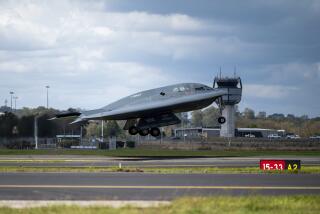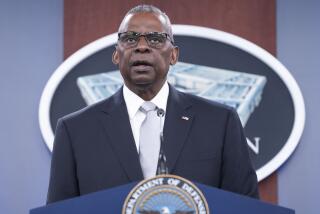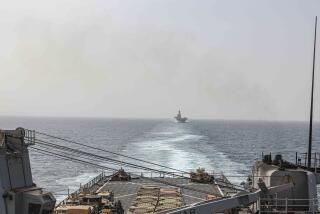Obama calls jet incident a âserious reminderâ
Reporting from Washington â President Obama said Monday that the U.S. would press ahead with its offensive against terrorist cells worldwide, just minutes after an Al Qaeda-affiliated group in Yemen claimed responsibility for the airplane bombing attempt over Detroit on Christmas Day.
âThis was a serious reminder of the dangers that we face and the nature of those who threaten our homeland,â Obama said in his first comments about the incident aboard a Northwest Airlines flight from Amsterdam. âWe do not yet have all the answers about this latest attempt, but those who would slaughter innocent men, women and children must know that the United States will do more than simply strengthen our defenses.
âWe will continue to use every element of our national power to disrupt, to dismantle and defeat the violent extremists who threaten us -- whether they are from Afghanistan or Pakistan, Yemen or Somalia, or anywhere where they are plotting attacks.â
Obamaâs remarks, delivered at a Marine base near his Hawaii vacation home, also marked the first time the administration had indicated it did not think Umar Farouk Abdulmutallab acted alone.
The 23-year-old Nigerian managed to smuggle a packet of highly explosive PETN aboard the flight, along with some liquid in a syringe that he used as a detonator, authorities said. After the explosives caught fire, he was overpowered by passengers and crew.
âWe will not rest,â Obama said, âuntil we find all who were involved and hold them accountable.â
Also Monday, Homeland Security Secretary Janet Napolitano acknowledged that the suspect -- who had a valid U.S. visa -- had evaded measures meant to identify potentially dangerous travelers and detect explosives.
After discussions with the White House, Napolitano took to the airwaves to try to minimize criticism over remarks Sunday in which she said the security system had worked after the incident -- without dwelling on the failure to keep Abdulmutallab off the plane.
When asked Monday on NBCâs âTodayâ show whether the system had âfailed miserably,â she answered: âIt did.â
âNo one is happy. . . . An extensive review is underway,â she said.
In his remarks, Obama outlined more aggressive security measures being taken, including enhanced screening and more federal air marshals on international flights. He said an investigation had been ordered to âdetermine just how the suspect was able to bring dangerous explosives aboard an aircraft and what additional steps we can take to thwart future attacks.â
Even before Fridayâs attack, the United States -- in conjunction with the Yemeni government -- had stepped up its counter-terrorism operations in the country, seeking to combat a rapidly expanding Al Qaeda network there.
Abdulmutallab has told authorities that the terrorist organization trained him and provided the explosives.
The Yemeni foreign ministry confirmed Monday that Abdulmutallab visited several times -- ostensibly to study Arabic at a school in Sana, the capital -- including one trip from early August until early December of this year.
âAuthorities are currently investigating who he was in contact with,â the ministry said. But one Yemeni official said it might be hard to trace Abdulmutallabâs steps, given how many students come from all over the world to study Arabic and Islam in the country.
Monday brought numerous developments, including a statement from the group Al Qaeda in the Arabian Peninsula claiming the would-be airline attack was retaliation for Yemeni airstrikes Thursday against suspected militants.
Anwar al Awlaki, a radical U.S.-born cleric, may have been killed in those strikes, although family members said he was alive. Awlaki had communicated with the accused gunman in last monthâs attack on Ft. Hood, Texas, that left 13 people dead.
In its communique, the Al Qaeda affiliate said Abdulmutallab had coordinated the plot with members of its group, using explosives they manufactured. The website posting was titled âThe Brother Mujahid Omar Farooq al-Nigeriâs Operation,â and it included a photograph of a smiling Abdulmutallab in front of an Al Qaeda banner.
The statement also boasted that Abdulmutallab had âinfiltrated all the advanced, new machines and technologies and the security boundaries in the worldâs airports . . . and he made all of what they spent on security development techniques a [new] heartbreak for them.â
Acknowledging that the attack had not achieved its goal, the statement said, âWe will continue on this path until we achieve success,â according to a translation posted by the NEFA Foundation, an organization of counter-terrorism specialists.
A U.S. counter-terrorism consultant said the communique appeared to be authentic.
In Amsterdam on Monday, authorities said they were investigating whether an accomplice had helped Abdulmutallab board Flight 253 without a passport -- possibly by claiming he was a Sudanese refugee.
In Nigeria, authorities interviewed Abdulmutallabâs family and friends, and searched several locations in the expanding global investigation.
In Britain, Scotland Yard was looking into who might have helped radicalize Abdulmutallab during his years as an engineering student there, ending in 2008.
In Detroit, a scheduled hearing in Abdulmutallabâs case was canceled without explanation. But prosecutors continued their efforts to get a DNA sample from him to match against evidence taken from the plane.
And in Washington, the Senate Homeland Security and Governmental Affairs Committee announced it would investigate lapses in airport security.
âWhat we know about the Abdulmutallab case raises two big, urgent questions. . . . Why arenât airline passengers flying into the U.S. checked against the broadest terrorist database, and why isnât whole-body scanning technology that can detect explosives in wider use?â said Sen. Joe Lieberman (I-Conn.), the committee chairman.
Congressional staffers also said the committee would investigate what steps U.S. officials took to investigate Abdulmutallab after his father -- a respected Nigerian banker -- shared concerns six weeks ago that his sonâs radicalized behavior and ties to extremists could pose a threat.
A State Department official said Monday that the father had been âfranticâ that Abdulmutallab had gone to Yemen, and had been hoping U.S. officials could help find his son.
The suspectâs name was added to a broad informational database of 550,000 possible threats, but not to other warning lists that would have either barred him from traveling to the United States, subjected him to more intensive searches and questioning, or even led to cancellation of his U.S. visa.
Republicans lashed out at the Obama administration Monday for what they called lapses in security and an inadequate response to the Christmas attack.
Rep. Peter T. King (R-N.Y.) said Obama had waited too long to address the nation, missing a crucial opportunity to explain the threat and prepare travelers for the inconvenience of intensified security checks.
He also blasted Napolitano for giving âcontradictory messagesâ on the incident and on the larger threat posed by Al Qaeda and affiliated militants.
Administration officials conceded that Napolitanoâs Sunday comments had touched off a controversy, prompting a high-level discussion about how the secretary could âclarifyâ her remarks.
But with Congress preparing to hold hearings on the incident, Obama advisor David Axelrod said he hoped Republican lawmakers would not try to exploit it for partisan advantage. âSeveral of them were out there bashing before they even got briefed,â Axelrod said. âThere are people who want to turn every issue into a partisan issue. Thatâs a shame.â
Axelrod said the administration had long focused on Yemen as an emerging terrorism trouble spot. âOur people are well aware of the threat there,â he said.
Paul Richter in the Washington bureau and Times staff writer Alana Semuels in Hawaii contributed to this report.
More to Read
Sign up for Essential California
The most important California stories and recommendations in your inbox every morning.
You may occasionally receive promotional content from the Los Angeles Times.










